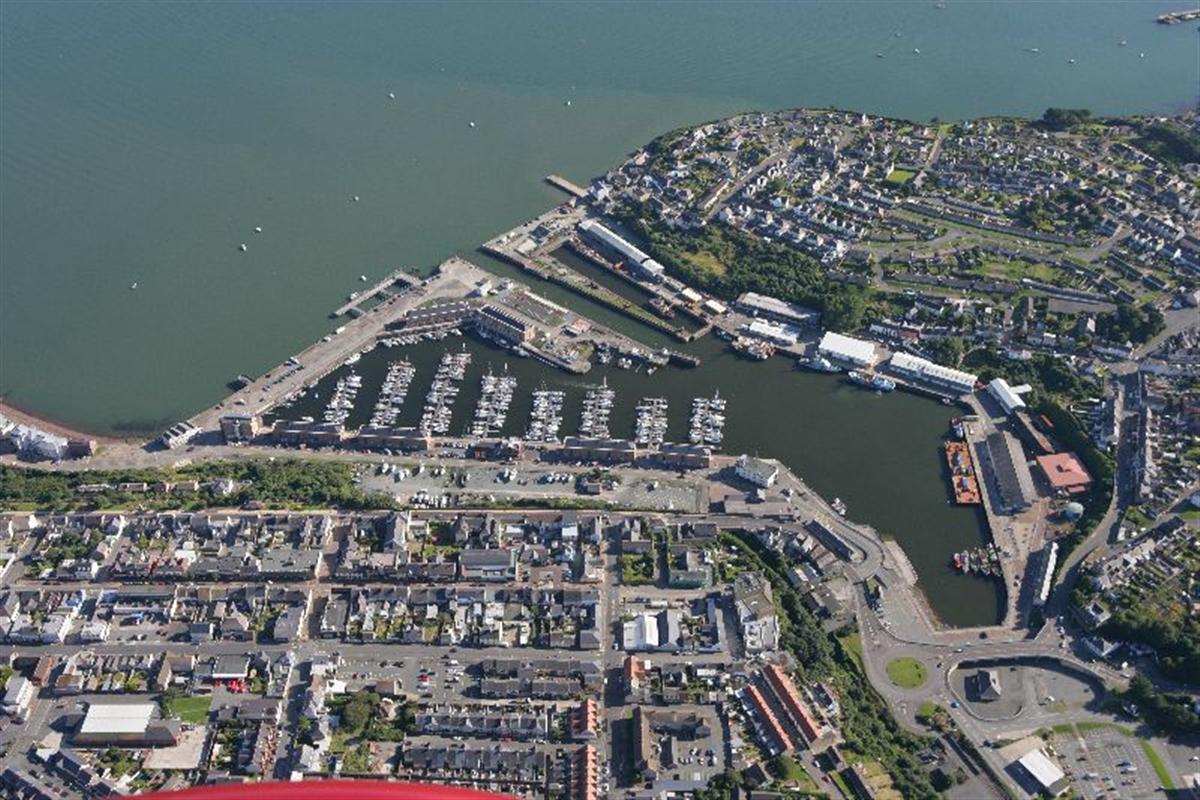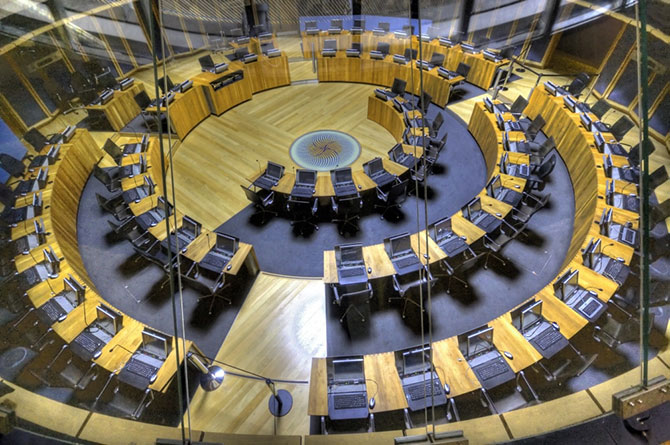Politics
Fishermen’s fury over transition sell out

‘LIKE drinking a pint of cold sick’, was how Scottish Conservative MP Douglas Ross described the UK Government’s climb down over fisheries policy in talks with the EU.
Mr Ross said the UK Government had “delivered far less than I hoped or expected” for fishermen, before adding: “There is no spinning this as a good outcome. It would be easier to get someone to drink a pint of cold sick than try to sell this as a success.”
The UK Government went into talks with the EU over a deal for the transition period following March 2019 expressing confidence that it would be able to regain control of UK fishing waters at the point the UK formally departs the European Union next year. However, despite rumblings from Michael Gove – Secretary of State for the Environment – and Scottish Conservative leader Ruth Davidson that the return of control over Britain’s fisheries was non-negotiable, it turned out that the UK Government thought it was.
The blow could have electoral ramifications in Scotland, where recent Conservative success in coastal communities has been helped by UK and Scottish Conservatives making the sort of noises that have encouraged Scottish fishermen to back them at the ballot box.
Regardless of the UK’s much-vaunted red lines, the EU made access to British waters by European fleets a red line of their own and the UK Government blinked first.
The CFP has faced harsh criticism in the past, with the Scottish Government calling it “the EU’s most unpopular and discredited policy”. The policy has been accused of being an overly centralised, top-down approach from Brussels to managing fisheries.
A key issue for fishermen is the equal access of EU vessels to UK waters. They argue that as the UK has a relatively large fishing zone compared to many of its continental European neighbours, EU fishermen benefit more from access to UK waters, a criticism supported by the University of the Highlands and Islands.
The Conservatives committed in their 2017 manifesto to leaving the Common Fisheries Policy. The manifesto outlines that the UK “will be fully responsible for the access and management of its waters”.
In the June 2017 Queen’s Speech, the Government announced a Fisheries Bill for the upcoming Parliamentary session. Its purpose is to “enable the UK to control access to its waters and set UK fishing quotas once it has left the EU.”
The UK Government has now abandoned that policy without parliamentary discussion.
The National Federation of Fishermen’s Organisations has reacted angrily, saying: ‘There will be a lot of concern throughout the fishing industry about what seems to be emerging.
‘We were led to believe that the UK would be as an independent coastal state from March 2019. The Prime Minister told us that only a fortnight ago. This timetable and perhaps much else has been conceded as part of the transition.
‘In fact, under international law the UK will be an independent coastal state from March. But we will immediately tie ourselves into an arrangement with the EU that is worse that we had before – as the UK will not have a seat at the table when the quotas are decided.
‘The UK’s central problem with the CFP has been that EU vessels, in value terms takes 4 times as much out of UK waters as our vessels take out of EU waters. That imbalance – essentially an exploitative relationship – will continue during the transition.
‘This is being presented as tactical concession that will not prejudice our longer term aims. But it has all the hallmarks of a capitulation’.
A recent report by the Public Policy Institute for Wales says that, while the Welsh fishing fleet as a whole could gain, there are large divisions in the industry, with most vessels, fishers, and ports likely to be ‘net losers’ from Brexit.
At Milford Haven, for example, over half the fish landed are from Belgian-registered vessels with local fishermen’s smaller boats unable to take advantage of a UK fishery zone post—Brexit.
In addition, only a smaller number of vessels face large potential gains, including some ‘flagships’ that land much of their catch in Spain.
The report’s authors say: ‘Parts of the UK fishing industry have been excited by the prospect of claiming exclusive rights to fish in UK waters and larger shares of fishing quota as a result of Brexit. However, the Welsh fleet comprises mainly small-scale vessels that would not benefit from exclusive access to an extended fishing area. They also catch primarily shellfish species that are not managed through quota limits.
‘Most of the seafood produced by the Welsh fleet is exported to EU countries or through EU trade agreements, therefore potential tariff and non-tariff trade barriers could significantly impact market access and competitiveness’.
The authors highlight that the structure of the Welsh fleet is unique and there is a real risk of it being ‘left behind’ in UK-EU negotiations by the demands of larger fishing interests.
Although there is a great deal of uncertainty regarding the outcomes of Brexit, looking forward they estimate that fishing opportunities relating to Welsh waters post-Brexit will be much larger than Wales’ current share. However, as any increases would accrue to existing UK quota holders, the Welsh fleet requires a new arrangement of quota sharing within the UK to get its fair share.
To take advantage of new fishing opportunities, the authors suggest both the UK Government and Welsh Government will need to make targeted changes to the management of fishing opportunities, so that benefits are felt in Welsh ports, coastal communities and wider society from what is, ultimately, a public resource.
However, that area of governance is one of those the UK Government has announced it will retain in its own hands after the UK leaves the EU.
Mid and West AM Simon Thomas, Shadow Cabinet Secretary for Energy, Climate Change and Rural Affairs for Plaid Cymru commented: “Concerns have been raised by the fishing industry following the announcement earlier this week about the transition period for the Common Fisheries Policy, under which the UK will be “consulted” on quotas rather than an equal partner in fishing negotiations with the situation remaining largely unchanged until 2021.
“Last month, the Public Policy Institute for Wales reported that Wales’ fishing fleet has specific needs, with smaller fishing vessels specialising in shellfish and that they need tariff free access to European markets. There are concerns of perishable foodstuffs being held up at customs, continued pressure on seafood species and no say over quotas for alternative catches.”
Mr Thomas continued: “As it is becoming increasingly clear that the Westminster Government cannot be trusted to represent the interests of Wales’ fishermen and women, measures need to be taken by the Labour Government to safeguard the fishing industry in Wales from the uncertainty of Brexit. We need to empower our communities and country in order to ensure that decisions affecting Wales are made in Wales.
“On so many issues, when Westminster refuses to do what’s best for Wales, we must have the tools to do things for ourselves.”
News
Welsh Lib Dems urge First Minister to return dodgy donation

THIS week in the Senedd, the Welsh Liberal Democrats have urged the First Minister to return the £200,000 donation he received from a company linked to environmental crimes.
Speaking to the Senedd on Wednesday, party leader Jane Dodds MS urged FM Vaughan Gething to return money donated to his campaign by Dauson Environmental, a refuse and recycling business owned by David John Neal.
Mr Neal received a 3-month suspended prison sentence in 2013 for illegally dumping waste at a conservation site on the Gwent levels.
His companies Atlantic Recycling and Neal Soil Suppliers were also prosecuted and given fines and costs of £202,000.
Then in 2017, Mr Neal was given another suspended sentence of 18 weeks, with fines and costs of £230,000 after failing to remove the waste.
The Welsh Lib Dems have called on the FM to return the donation, as part of wider calls for a shift away from the influence of “big money” in Welsh politics.
Commenting, the Leader of the Welsh Liberal Democrats Jane Dodds MS said:
“This entire episode has casted a dark shadow upon Welsh democracy and has rightfully led to many questioning the integrity of Vaughan Gething’s leadership campaign and the way our democracy works here in Wales.
Unfortunately for many of us this is hardly surprising, as our political system has been broken for quite some time now.
A system that empowers the elite donor class whilst simultaneously shutting out the voice of the voter is a perversion of democracy itself.
This is why our wider goal must be to remove the influence of ‘big money’ from Welsh politics once and for all.
We cannot have another government that prioritises the interests of its financial benefactors over those of the Welsh people.
We need to take a firm stance in rooting out the influence of cash in Welsh politics, for the sake of our communities we must start prioritising their interests and needs instead of having more self-serving politicians.”
Politics
Pembrokeshire flag policy to avoid ‘creating tensions’ moved

AN OFFICIAL policy for flying flags at, and lighting up, Pembrokeshire’s County Hall in order to avoid “the potential to cause controversy and create tensions between community groups,” is to be presented to full council.
At the April meeting of Pembrokeshire County Council’s Policy & Pre-Decision Overview and Scrutiny Committee, members agreed – with one vote against – to recommend official guidance for the flying of flags and lighting up of County Hall is backed by full council at its May 9 meeting.
The call for official guidance had been made following a March request by Cllr Huw Murphy for the Haverfordwest home of Pembrokeshire County Council to fly the Falklands flag on June 14, to mark the islands’ “return of democratic rule following an illegal military occupation by Argentina” 40 years beforehand, in 1982.
At that meeting, members agreed to refer the matter to the committee, along with official guidance on lighting-up, through a cross-party group.
Leader Cllr David Simpson said: “Like all symbols, flags and the lighting up of buildings are open to wide-ranging interpretations and therefore also have the potential to cause controversy, and create tensions between community groups whose opinions may differ, a situation which we ourselves have experienced here previously.
“County Hall should be a neutral venue and I therefore suggest we secure cross-party support for any cause requesting the flying of a flag or lighting up of the building.”
Members of the April committee heard a long list recommendations and conditions for both flags and the ‘lighting up,’ one of the recommendations for refusal was “for any party political purposes either, locally, regionally, nationally or internationally”.
It also said any requests “considered to be of a political or potentially controversial nature,” will require the consideration and approval of the leader of the council in consultation with the chief executive, in accordance with the code of recommended practice on Local Authority publicity in Wales.
The final decision will be made by full council at its May meeting.
County Hall has previously been ‘lit up’ for a wide variety of reasons including Holocaust Memorial Day, Universal Children’s Day, International Women’s Day, in tribute to NHS workers, and to mark domestic abuse awareness month.
It has also been lit up for LGBT+ History Month and in support of the Black Lives Matter movement.
Politics
Plans to reform the Senedd edge nearer

PLANS to expand the Senedd and change the voting system have moved a step closer, but MSs called for urgent action to address a lack of accountability.
The Senedd voted on amendments to the members and elections bill, which would increase the size of the Welsh Parliament from 60 to 96 members.
Under the bill, the 32 constituencies that will be used in the next general election would be paired to create 16 for the 2026 Senedd poll, with each returning six members.
However, proposals to introduce a recall system and make it illegal for Senedd members or candidates to deliberately deceive the public were withdrawn at the eleventh hour.
MSs held a stage-three debate, the final opportunity to alter the reforms, on April 30 ahead of a crunch vote next week which coincides with 25 years since the first Senedd election.
Plaid Cymru’s Adam Price proposed making deliberate deception by candidates or Senedd members a criminal offence, with conviction resulting in disqualification.
The former party leader raised concerns about falling public trust in politics worldwide, warning that a credibility gap has become an accountability chasm over the decades.
“Now, we’re staring into an abyss,” he said. “We’re looking at a future world of deepfakes, post-truth politics and wave after wave of disinformation.”
The Carmarthen East and Dinefwr MS told the chamber the proposal would be a world first, stressing: “We need to do something, and we need to do something urgently.”
Supporting the amendment, the Conservatives’ Darren Millar said it is illegal for a doctor to mislead a patient as he asked: “Why should it be any different for us?”
Lee Waters, a Labour MS, backed the “reasonable” proposal despite initially being sceptical, pointing to bipartisan support for bringing politics in line with other professions.
Jane Dodds, the Lib Dems’ leader in Wales, added her support, saying a 2021 survey found 63% of voters view politicians as being “out for themselves” compared with 48% in 2014.
Mick Antoniw, who is counsel general, the Welsh Government’s chief legal adviser, said further detailed legal and policy analysis is required to avoid unintended consequences.
Mr Antoniw, who is in charge of the bill, emphasised the importance of members being able to speak freely and suggested Wales does not have the powers to create such an offence.
Mr Price withdrew the amendment, saying he did not want to fracture emerging consensus by forcing a vote, but he stressed the Senedd must legislate this term.
Mr Millar called for a recall system, which would allow voters to remove a Senedd member between elections, similar to the one introduced in Westminster after the expenses scandal.
The Tory MS told the chamber a system of recall is an important accountability mechanism, which empowers voters to pass judgement on their representatives.
He said: “It would ensure trust and accountability are at the heart of everything we do – not just at election time but throughout the time members are in office.”
Seemingly referring to Rhys ab Owen, who is serving a 42-day suspension without salary from the Senedd, Mr Millar said: “These are matters of live public interest.”
Vikki Howells, who chairs the Senedd standards committee, said the committee will work on recommendations around a recall system as part of a wider inquiry on accountability.
Ms Dodds said a recall mechanism would be a pivotal step to address eroding public trust.
She raised the Citizens’ Assembly on Democracy’s concerns about an “embarrassing political culture of dishonesty and lack of serious consequences for bad behaviour”.
The former MP, who herself won a 2019 by-election triggered by a recall petition before her election to the Senedd, pointed out that Boris Johnson resigned at the threat of recall.
Mr Antoniw said the Welsh Government would not vote for the amendments but ministers stood ready to support implementation of the committee’s recommendations.
Mr Millar withdrew the amendment in light of the cross-party inquiry but the Clwyd West MS warned time is running out to implement recall before the 2026 election.
The Senedd voted down calls for a referendum and to change the proposed closed-list electoral system which would see people voting for parties rather than individuals.
Suggesting a flexible-list system, which would give voters more say over who is elected, Mr Millar described closed lists as a power grab that would damage Welsh democracy.
He warned that voter turnout – which has never topped 50% in a Senedd election – could be even lower in future if people are given less say over who represents them.
Mr Millar explained a flexible-list system would give voters more choice, with any candidate receiving more than 10% of the vote moving to the top of the pile.
Heledd Fychan, for Plaid Cymru, said her party continues to favour the single-transferable vote, which allows people to rank candidates, or a flexible-list system.
But she stressed the need for pragmatism and compromise with a two-thirds supermajority required for the bill to pass through the Senedd.
Ms Fychan welcomed that Wales would become the first UK nation to entirely move away from the “harmful” first-past-the-post system used in Westminster elections.
-

 News2 days ago
News2 days agoPolice investigating after woman found dead on beach near Pennar
-

 News2 days ago
News2 days agoPolice discover body in search for Luke Stephenson, 19
-

 News2 days ago
News2 days agoCouncillors block Milford Haven boxing event – promoter to appeal
-

 Crime3 days ago
Crime3 days agoLlandissilio man accused of making hundreds of child abuse images
-

 Business6 days ago
Business6 days agoLargest Welsh port appoints communications and marketing director
-

 Business3 days ago
Business3 days agoLidl GB eyes Pembroke Dock for new larger supermarket
-

 News13 hours ago
News13 hours agoBeautiful, funny and lovely: Family pay tribute to Sian Batchelor
-

 News2 days ago
News2 days agoSearch efforts continue for missing teenager Luke Stephenson



































